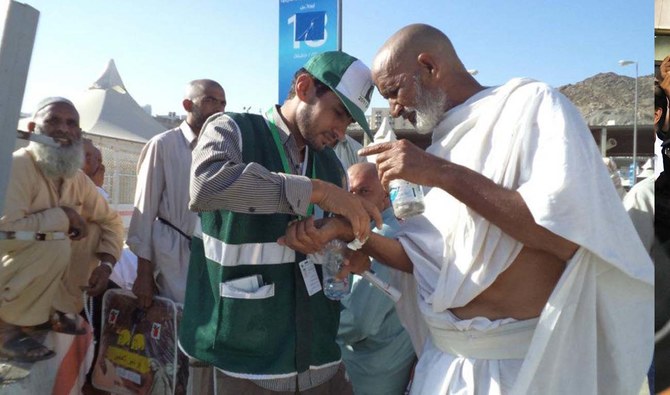PESHAWAR: Thirty-two-year old Pakistani Asif Bashir was working as a Hajj assistant in Makkah on a June afternoon earlier this year when he saw a number of pilgrims faint and collapse to the ground.
Without thinking twice, Bashir along with his five-member team rushed to provide first aid to the pilgrims, most of whom were Indians, and transported 26 to hospital.
Saudi Health Minister Fahd bin Abdurrahman Al-Jalajel has said 83 percent of the 1,301 people who died during Hajj this year were unauthorized pilgrims who walked long distances in soaring temperatures to perform the Hajj rituals. Saudi authorities cracked down on unauthorized pilgrims, expelling tens of thousands of people but many, mostly Egyptians, managed to reach holy sites in and around Makkah, some on foot, and unlike authorized pilgrims did not have hotels to return to to escape the scorching heat. After the deaths, Egypt revoked the licenses of 16 travel agencies that helped unauthorized pilgrims travel to Saudi Arabia.
Hajj assistants like Bashir were instrumental in saving lives amid extreme high temperatures at Islamic holy sites in the Kingdom this year.
“It was an emotional moment when you save the life of anyone, it is the best feeling, it is also in the [Holy] Qur’an that ‘saving the life of one person is like saving the whole of humanity’,” Bashir told Arab News in an interview in his hometown of Peshawar. “I don’t have enough words to explain the feeling.”
Bashir, among 550 Pakistanis sent by the government to assist Hajj pilgrims, said it was “strange” to see people collapsing and falling to the ground, but he felt “blessed” to have gotten the opportunity to save them.
“On that specific day, if I remember correctly, with my team, I transported more than 26 people to hospital. Unfortunately, nine of them died and 17 survived,” Bashir said.
Among the survivors were 15 Indians, one British and one Canadian national.
“We [don’t see] the race [or] nationality, but I was deployed near the Indian camps, Indian Maktabs. The pilgrims were from multiple nationalities, but mostly they were Indians, and they were unconscious. When I saw that they were unconscious, I decided with my team that I will help them.”
Bashir and others gave the ill pilgrims water and ORS [Oral Rehydration Solution] and transported those who needed medical attention to a nearby hospital that was almost 5-6 kilometers from my check-post.
In recognition of Bashir’s efforts, Indian Minister for Parliamentary and Minority Affairs Kiren Rijju wrote him a letter of gratitude.
“Your dedication, compassion and unwavering commitment to serving the pilgrims have been truly commendable,” Rijju wrote. “I am particularly impressed by your remarkable act of kindness and bravery in providing first aid and transporting patients to the hospitals on your shoulder, when ambulances and medical staff were occupied.”
Bashir said he wishes for Pakistan and India to have cordial relations and work together for each other’s development.
The bitter enemies have fought multiple wars, mainly over the disputed Himalayan territory of Kashmir, since their independence from British rule in 1947. They often trade barbs and diplomatic ties have been frozen since August 2019 when New Delhi revoked the autonomy of part of Kashmir it controls.
“My sole purpose is to serve humanity,” Bashir said, “and I want to see this region, between Pakistan and India, prosperous.”












